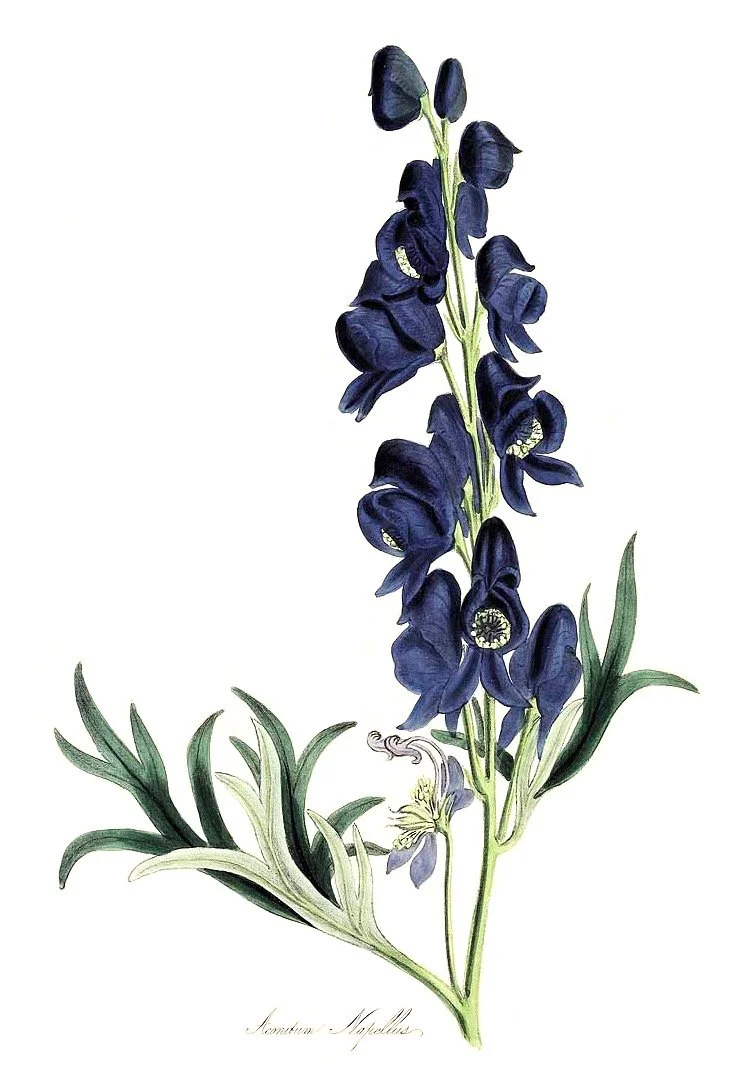Monkshood
Monkshood
MONKSHOOD SEEDS
Aconitum napellus
Among the most poisonous plants in nature. And a gorgeous hardy perennial. Native to Central Europe and used for many millennia as a medicinal and ritual and homicidal agent. Not recommended for gardens frequented by curious children, as merely handling these plants with bare hands can have deleterious effects. Every part of these plants contains the alkaloid aconitine, but it is especially concentrated in the root, an ancient source of arrow poison throughout Eurasia. Under no circumstances do we recommend utilizing this species for purposes other than the aesthetic.
The extraordinary nature of this species has seen it extolled throughout ancient myth and legend, where it was once thought to have erupted from the spilled blood of Prometheus, and was an integral component of the medieval witches' ointment. The magical and historic lure of these plants is hard to resist, but careful research is advised in order to host them in the garden safely. Best in a dedicated ornamental border or in an expansive meadow where animals do not graze.
These seeds are challenging to germinate indoors, as they require an extended warm-cold-cool cycle of treatment to be coaxed to life. Sow seed into pots of moist soil, tucking just beneath the soil surface and pressing to keep snug. Mist generously and cover with plastic to maintain moisture. Keep at room temperature for at least two weeks and up to a month before placing in the refrigerator for 6-8 weeks, then bring pot into bright light at COOL temperatures, no warmer than 60°F, like a north windowsill in winter or an unheated basement under grow lights. Any excessive heat at this time will prevent germination and the whole stratification process may have to begin again. In our experience the absolute best way to germinate these seeds is outdoors. After allowing the pot to sit at warm room temperature for two weeks or so place it outdoors to overwinter in a sheltered location, away from direct sunlight and critters. The seeds will begin to germinate during the first warm days of spring, after several freeze and thaw cycles. In the Northeast the pots may be placed outdoors as late as March, as it really does seem to be the changes in temperature that break dormancy better than anything else. Be sure to keep soil moist and check regularly for germination as some of these seeds germinate at very cold temperatures.
Wearing gloves, gently prick out seedlings with true leaves to grow on in deep 3" pots at cool temperatures in bright light. We keep the seedlings that have germinated outdoors outdoors, which eliminates the need to harden them off. Well rooted plants may be transplanted very early in spring, and up to around the date of the last spring frost. They may also be potted up into successively larger containers as necessary and transplanted in autumn.
USE GLOVES WHEN HANDLING THESE PLANTS!
Aconitum species prefer to grow in mostly sunny and moist fertile soils. Though these plants have a large tuberous root, it withers along with the rest of the plant in winter. Consistent moisture in spring is an absolute necessity. Bright morning sun is sufficient where summers are hot. Where they are happy these stunning plants can grow to 5' and bloom for several weeks in late summer into autumn. The big blue violet flowers are beloved by bees. Hardy to zone 3.
Packet contains at least 30 seeds.
